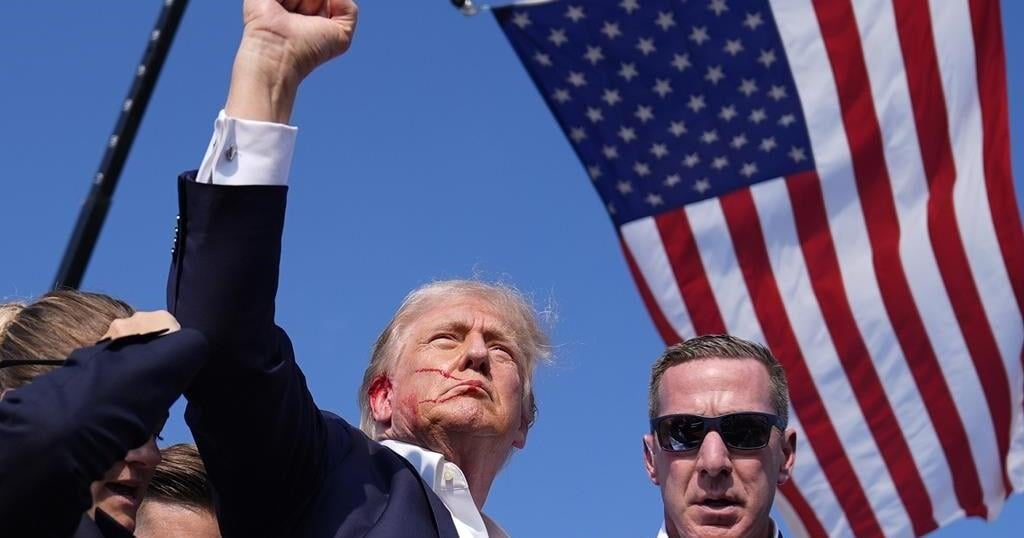WASHINGTON – The image is a stark one: former U.S. president Donald Trump pumping his fist into the air with an American flag in the background as blood trickles down the side of his face following a shooting at a campaign rally.
Photographs capturing the aftermath of the attack are already indelibly imprinted on the American consciousness, both for their dramatic content and for their appearance at a critical time in an increasingly polarized political climate for the United States.
“That will be in history books forever,” said Matthew Lebo, a specialist in U.S. politics and chair of the political science department at Western University in London, Ont.
Rhetoric has become increasingly antagonistic in recent decades, he said, culminating in the attempted assassination of Trump at a rally in Pennsylvania on Saturday.
Video showing Trump touching his ear, then dropping to the ground and being covered by Secret Service agents, has played on a loop across news stations in the United States since the shooting.
The FBI early Sunday identified the shooter as Thomas Matthew Crooks, 20, of Bethel Park, Pa. He was fatally shot by Secret Service agents at the scene.
One person attending the rally was killed and two others were critically injured.
The shooting, which is the most serious attempt to assassinate a president or presidential candidate since an attack on Ronald Reagan in 1981, could be a watershed moment as the political environment in the United States becomes increasingly divisive.
“It’s a sign of fraying democracy,” Lebo said.
National surveys on support for political violence in the U.S. has shown a rising tide on both the right and the left, said Robert Pape, a professor at the University of Chicago who specializes in international security affairs. He has been conducting the surveys since Spring 2021.
The most recent survey from June 24 shows 10 per cent of the American public supported the use of violence to prevent Trump from becoming president. Seven per cent supported the use of force to restore Trump to the presidency.
Pape said that shows there are volatile wings of the the polarized public that could act out in dangerous ways.
“We have to understand that left on its own and without a tremendous extraordinary effort, we are likely to see spirals of violence, escalations of violence, as we head into this election season,” he said.
Much of the American public has long been deeply divided about issues that will shape the future of the country. One major problem is how the U.S. will tackle immigration, Pape said, with some Americans wanting it to stop completely and others seeking to embrace it.
He said divisions are so drastic that it’s become a “structural problem that’s going to lead to lots and lots of anger.”
The rage isn’t connected to any single party. There’s been a rise in threats against both Republican and Democratic members of Congress. Political polarization is also increasing globally.
Pape said he briefed the Canadian government about a year ago on the outcomes of his research. He’s also consulted with other governments and policing agencies around the world.
His research shows real cause for concern, but Pape said it is not hopeless. Political leaders at all levels must reach out to their supporters to tell them violence is immoral and illegal.
“The anger should go into voting and not violence,” he said.
Trump called Sunday for unity and resilience. Joe Biden, who is running against Trump as the presumptive Democratic nominee, said Saturday that “there’s no place in America for this type of violence” and was expected to address the nation on Sunday afternoon.
Shocked leaders across the political divide largely called for calm, saying violence is never the answer.
It’s unclear how the incident will influence voters or campaigns ahead of the November presidential election, Lebo said.
The Democrats are likely to lay low this week – but, Lebo said, it was always the plan as they are usually quiet during the Republican National Convention. This year’s event is set to take place in Milwaukee starting Monday.
Lebo said he has seen some political actors within the parties using the shooting to further galvanize voters’ anger towards their side.
“When the political parties use that to further polarization … I find that particularly dangerous,” he said.
This report by The Canadian Press was first published July 14, 2024.
